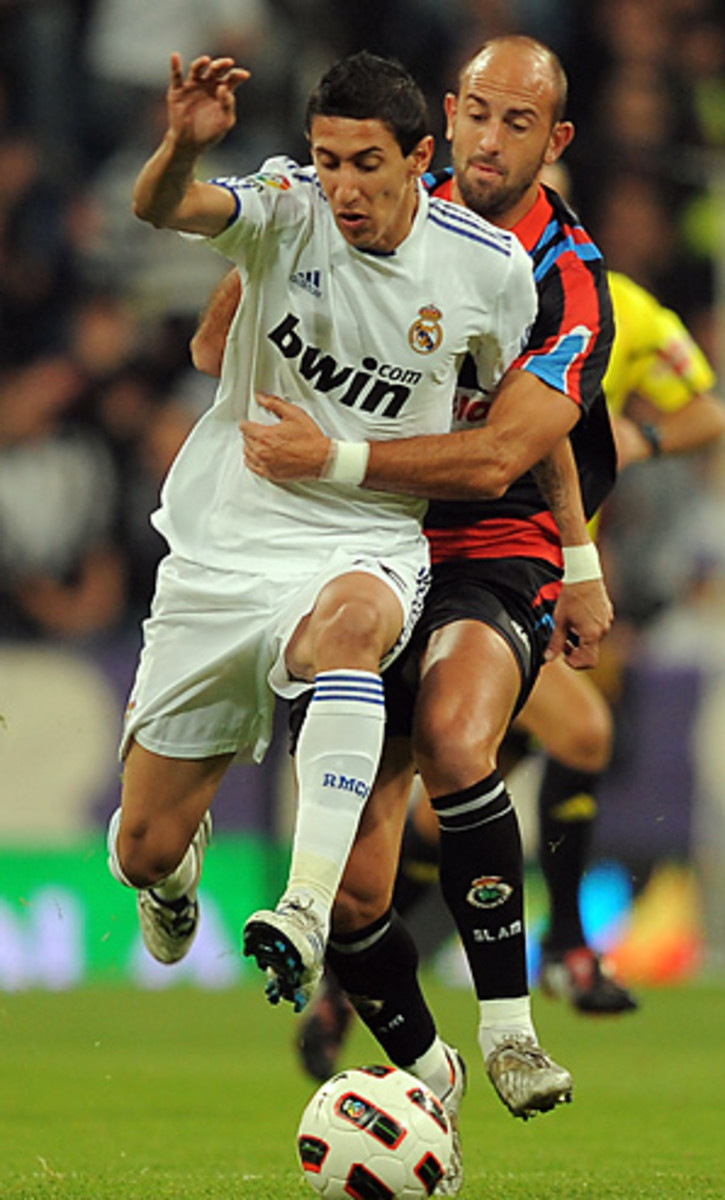Di María becoming an integral part of Mourinho's vision at Real Madrid
Cristiano Ronaldo got almost all the goals and absolutely all the headlines, the cover of Marca appearing to reveal its entire editorial line with "CR7, CR7, CR7 ... and more CR7," but when Real Madrid trashed Racing Santander 6-1 on Oct. 23, you could make a very good case for its best player being Ángel Di María. And one man making that case -- one man making that case very, very publicly indeed -- was Real manager Jose Mourinho.
Sure, Ronaldo scored four. But Di María made the first and the fourth and was brought down for the penalty for the fifth. As Ronaldo celebrated the goal, Mourinho called Di María over toward the bench and embraced him. It was an act of justice and recognition. It would not be the last one, either.
The midfielder had been superb. Unexpectedly so.
During the World Cup, Di María had not exactly impressed for Argentina. For Madrid, it was too late. It had already signed him for $35 million from Benfica. It seemed like a heck of a lot of money. In fact, it seemed like a rip-off. Insiders reveal that Florentino Pérez, the Real Madrid president, was starting to wonder if he had done the right thing. The media certainly wondered as much. Di María was Madrid's most expensive signing. Should he really have been?
Publicly, Mourinho said Di María interested him but "only at the right price." He also asked out loud whether the Argentine would be able to recreate his form from the Portuguese league once he had arrived in Spain. Privately, it was a very different matter. Mourinho insisted that Madrid sign Di María. And when he encountered resistance from Pérez, he insisted some more.
When Madrid got him, Benfica's coach Jorge Jesus announced, "What a great signing Madrid has just made!" In the final third, he said, "Di María is unstoppable." He was a traditional outside left, a rarity in Argentina, where teams tend to play with "interiors."
Di María had struggled initially to make it too: Rosario Central had rejected him the first time around. But Mourinho had announced him as "the typical player from Rosario."
Rosario is where Leo Messi is from.
Mourinho was not alone. Diego Maradona also was quick to champion him -- he made a point of very ostentatiously standing to applaud a Di María goal for Benfica last season when he dashed past three defenders. "One on one, he's devastating," Maradona said. "Give him 10 one-on-ones and he'll win out eight times. He's a fantastic player."
There had been glimpses of this season. Quick -- very quick -- and skillful, Di María scored a superb goal against Real Sociedad. He stretched defenses and opened up spaces, dashing down either wing. But still people weren't sure.
And it was not his innate qualities that made him stand out against Racing.
Or at least not only those.
Bit by bit, something was changing in his game. And against Racing, he played on the other side of the pitch. Not so much so that he was encouraged to come inside and go at the opposition -- not only that, anyway -- but so that he could serve an important tactical function too. The typical Argentine outside left was becoming an inside right. He was becoming a typical Mourinho player.
It was his darting runs that people most noticed, like the run that led to the penalty. But Mourinho was more impressed with something else Di María gave to the team. He was impressed with his effort and discipline, with the fact that he did everything Mourinho asked him to do. Mourinho had insisted that a team that played the way Madrid does needs an extra man to support the midfield. By playing Di María on the right, he became that man, dropping inside alongside Sami Khedira and Xabi Alonso.
It was from there that Di María provided the 30-yard pass that set Gonzalo Higuaín free for the first goal. It was from there, too, that he showed that while he might be called "Fideo" (the Noodle) because he is so skinny (it is a Spanish equivalent of beanpole), he can certainly put his foot in. His off-field timidity was washed away on the pitch. But he did not just work hard, he worked intelligently too. People had asked if he was a Madrid player; now he was proving that he was. Just as important, he was proving that he was a Mourinho player.
If some at the Bernabéu had not noticed the "other" side to his game, Mourinho made sure they did. He made a tactical change that appeared more about playing to the gallery than playing to the chalkboard. With 15 minutes to go, he asked Di María to go to left back -- from where, incidentally, he played rather well. Mourinho seemed to be sending a message to his players and also to the fans: This is what commitment is. Look how hard this lad works. Yes, Ronaldo has scored four, but let's recognize Di María too. You weren't sure about him at the start, you must be sure now.
The impression was confirmed when Mourinho took a cramp-ridden Di María off -- even though there were only three minutes to go and even though he had already made all his changes. As Di María came to the edge of the pitch, Mourinho went to meet him and embraced him again. Then he began, very pointedly, to applaud. The message caught on immediately. The fans, who had been clapping a little timidly, gave Di María a standing ovation.
Mourinho had not only gotten the best out of Ángel Di María, but he had also made sure that, for all the attention on Ronaldo, the fans recognized the Noodle too.






